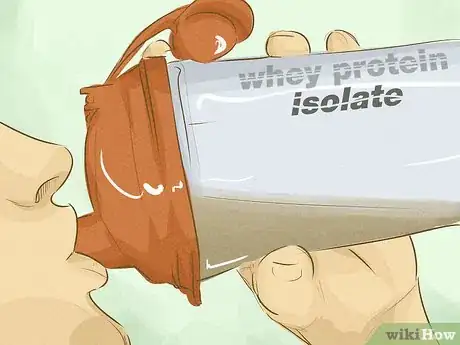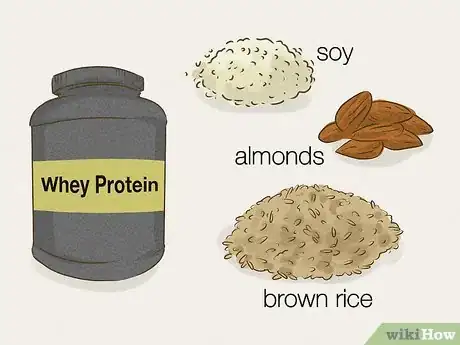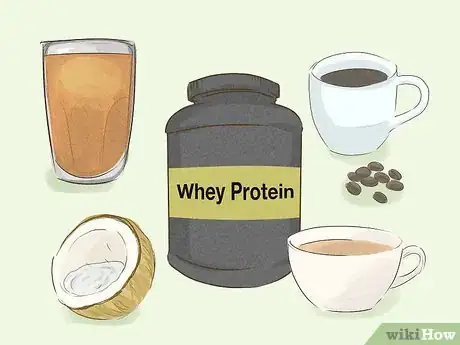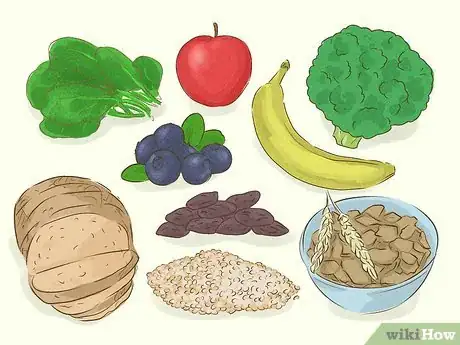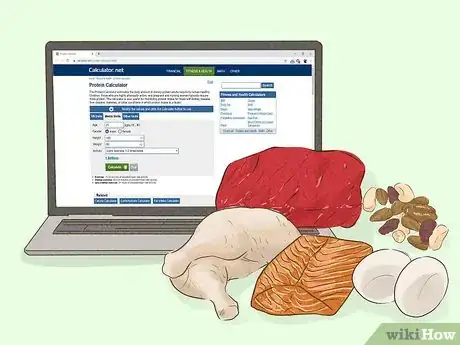This article was co-authored by wikiHow Staff. Our trained team of editors and researchers validate articles for accuracy and comprehensiveness. wikiHow's Content Management Team carefully monitors the work from our editorial staff to ensure that each article is backed by trusted research and meets our high quality standards.
There are 15 references cited in this article, which can be found at the bottom of the page.
This article has been viewed 4,994 times.
Protein shakes are a great-tasting way to increase your protein intake and feel fuller on fewer calories. However, protein shakes can also cause the unfortunate side-effect of excess gas in your digestive system. This happens because it takes your body longer to digest protein than other items like carbs. As the protein sits in your digestive tract, it starts to ferment, which creates gases like nitrogen and sulfur. This intestinal gas is not a bad thing, in general. However, it can be embarrassing and annoying when the gas needs to escape your body as a fart or burp. Thankfully, there are several things you can do to reduce or eliminate this excess gas production and avoid those embarrassing moments.
Steps
Reducing Lactose in the Shakes
-
1Change the protein powder you use to one with less lactose. Switch to a protein powder that contains a whey protein isolate rather than a whey protein concentrate. Whey protein isolates contain less lactose and therefore may help reduce intestinal gas in your digestive system. Read the ingredients on the packages of protein powder to determine which type of whey protein is used.[1]
- Whey protein is one of the two types of protein found in milk; the other protein is casein.
-
2Switch to a plant-based protein powder to eliminate lactose from your shakes. Change from a milk-based whey protein powder to a plant-based protein powder. Since whey protein is created from milk, all versions of it will contain some level of lactose. Use a protein powder created from plants to eliminate the lactose you receive from your protein shakes and possibly reduce the intestinal gas produced.[2]
- Plant-based protein powders can be made from hemp seeds, brown rice, peas, soy, almonds, chia seeds, brazil nuts, cranberries, or pumpkin seeds.
- You can also find protein powders made from collagen and egg whites. However, these options would not be considered vegan.
-
3Reduce the amount of lactose you consume by using non-dairy liquids in your shakes. Make your protein shakes with non-dairy milk, coconut water or milk, iced coffee or tea, or juice instead of dairy milk. You can also use a combination of these items, rather than just one. None of these products has lactose, which may help to reduce intestinal gas. However, they may have other downsides you may need to be aware of (e.g., sugar, calories).[3]
- Also consider adding other items to your protein shake that will increase your fibre intake. For example, blueberries, strawberries, oats, flaxseeds, carrots, apples, bananas, raspberries, kale, chia seeds, or peaches.
Adding Beneficial Dietary Options
-
1Drink more water to speed up your digestive system. Drink a glass of water after every protein shake. Also, drink a glass of water with each of your meals. Bring a water bottle with you when you exercise and remember to drink frequently. Water is essential to life and helps to break down the foods you’ve eaten. It can also soften items in your digestive system and prevent constipation.[4]
- Get into the habit of always having a bottle of water with you–at home, in the car, at work, at school, on the bus or subway, etc.
-
2Increase your fibre intake to offset the increased protein intake. Add more fibre-rich foods or add a fibre supplement to your diet. Adult women require 25 grams (0.88 oz) of fibre per day. Adult men require 38 grams (1.3 oz) of fibre per day. This is especially important if you’ve increased your protein intake as part of a weight-loss regimen and have also reduced your carb intake. The decreased carbs (and fibre is a carb) means your digestive system may be off-balance and may be producing more intestinal gas.[5]
- Vegetables high in fibre include lettuce, carrots, spinach, baked potatoes and sweet potatoes with skin, broccoli, squash, string beans.
- Fruits high in fibre include apples, bananas, peaches, pears, tangerines, berries, figs, and dried fruit.
- Grains high in fibre include oatmeal, whole-grain bread, brown rice, popcorn, bran, shredded wheat, puffed wheat, whole-wheat pasta, and bran muffins.
- While it’s nutritionally better to get your fibre from food, you can also opt for a fibre supplement that can be mixed with water and consumed as a drink.
-
3Take probiotics to increase beneficial bacteria in your digestive system. Add more probiotic-rich foods to your diets, such as some types of yogurt and cheese, kefir, sauerkraut, and kimchi. Alternatively, take a probiotic dietary supplement every day to increase the beneficial bacteria in your digestive system without needing to worry about what types of food contain probiotics.[6]
- Certain yogurts are specifically made with live and active cultures, which means they have probiotics in them. Consuming these types of yogurts are the easiest way to add probiotics to your diet.
- Probiotic supplements can be found at a drug store or pharmacy. Speak with your pharmacist to determine which supplement is the best option for you.
-
4Drink herbal teas to reduce intestinal gas and bloating. Make yourself a cup of peppermint or chamomile tea to help relieve intestinal gas.[7] You can purchase both peppermint and chamomile tea at the grocery store or a health food store. Treat yourself to a couple of mugs of either tea a day, or on the days you feel your gas symptoms more severely.[8]
- You can also take peppermint oil in a capsule format and receive the same benefits.
- Check with your doctor or pharmacist before consuming herbs and herbal teas, as some can interact negatively with prescription medications you may be taking.
Changing Your Lifestyle
-
1Calculate your daily protein requirements to manage your protein intake. The recommended dietary allowance for protein, or the minimum amount you should consume, is 0.8 grams per kilogram of body weight. Weigh yourself to obtain your current weight. If you weighed yourself in pounds, multiply that amount by 0.36 to obtain your weight in kilograms. Then, multiply your weight in kilograms by 0.8 to determine your daily protein intake. Plan your daily diet such that you don’t eat more or less protein than required.[9]
- For example, if you weigh 150 pounds, multiply 150 by 0.36 to get 54 kilograms. Then multiple 54 kilograms by 0.8 to get 43.2 grams of protein per day.
- To convert your daily protein amount in grams to ounces, multiply it by 0.035. For example, 43.2 grams is equivalent to 1.512 ounces.
- This is an average amount for an average, healthy adult. Weight and exercise level can affect the amount of protein you should consume. Use a protein calculator (https://www.calculator.net/protein-calculator.html) to determine a recommended amount based on these additional variables.
-
2Get at least 30 minutes of exercise every day to calm your digestive system. Try to schedule a minimum of 150 minutes of moderate activity or 75 minutes of vigorous activity every week. Spread exercise out over all 7 days of the week, if possible, and aim for at least 30 minutes of moderate activity per day.[10] Exercise can strengthen your digestive tract and make digestion more efficient for you.[11]
- While exercise is important for digestion, exercising while you’re digesting a meal is not a good idea. Wait about 2-3 hours after a meal before exercising.
- Moderate activity can include brisk walking, swimming or even mowing the lawn (or shovelling the driveway, depending on the time of year).[12]
- Vigorous activity can include running or aerobics.
-
3Slow down when eating and drinking to reduce the amount of air you swallow. Take your time when eating or drinking. Don’t carry on a conversation while eating. Avoid chewing gum or sucking on hard candies, drinking carbonated beverages, and smoking; all of which can cause you to swallow excess air that can then cause you to burp. This also means you want to avoid chugging your protein shake. Instead, take your time and enjoy your shake.[13]
- Swallowing excess air is called aerophagia and is essentially caused by swallowing more than needed, even when you’re not eating and drinking.
- Poor fitting dentures can also cause you to swallow excess air.
-
4Take an over-the-counter medication that reduces gas. Look for a product that contains one of the following at your local drug store or pharmacy: activated charcoal, simethicone, lactase enzyme, or alpha-galactosidase. Ask your pharmacist for help finding the product that’s best for you. All of these items will help reduce gas in your intestines by breaking down problematic foods or reducing gas bubbles.[14]
- If your gas problems start happening more often or start to get worse, you may want to seek advice from your doctor. This is especially true if you’re also experiencing weight loss, diarrhea, vomiting, or heartburn at the same time.
Warnings
- Before taking any type of supplement, talk to your pharmacist about your current prescription medications. Some prescription medications will not work as well when taken with some types of protein powders and probiotics.[16]⧼thumbs_response⧽
- Consuming too much protein can actually be bad for you and could cause kidney problems, acne, high cholesterol, and even weight gain. Therefore, it’s important to know how much protein you should consume every day and not add more protein to your diet than you need.[17]⧼thumbs_response⧽
References
- ↑ https://medlineplus.gov/druginfo/natural/833.html
- ↑ https://www.godairyfree.org/food-and-grocery/dairy-free-protein-powders#
- ↑ https://www.coachmag.co.uk/nutrition/1099/protein-shake-recipes
- ↑ https://www.mayoclinic.org/healthy-lifestyle/nutrition-and-healthy-eating/expert-answers/digestion/faq-20058348
- ↑ https://medlineplus.gov/ency/patientinstructions/000193.htm
- ↑ https://www.mayoclinic.org/what-are-probiotics/art-20232589
- ↑ https://www.brighamandwomens.org/patients-and-families/meals-and-nutrition/bwh-nutrition-and-wellness-hub/special-topics/gas-beat-the-bloat
- ↑ https://www.readersdigest.ca/health/conditions/indigestion-try-these-tummy-tamers/
- ↑ https://www.health.harvard.edu/blog/how-much-protein-do-you-need-every-day-201506188096
- ↑ https://www.mayoclinic.org/healthy-lifestyle/fitness/expert-answers/exercise/faq-20057916
- ↑ https://www.manhattangastroenterology.com/exercise-affects-digestion/
- ↑ https://www.mayoclinic.org/healthy-lifestyle/fitness/expert-answers/exercise/faq-20057916
- ↑ https://www.mayoclinic.org/diseases-conditions/gas-and-gas-pains/in-depth/gas-and-gas-pains/art-20044739
- ↑ https://www.mayoclinic.org/diseases-conditions/gas-and-gas-pains/diagnosis-treatment/drc-20372714
- ↑ https://u.osu.edu/buckmdblog/2009/11/15/help-i-cant-stop-farting/comment-page-2/
- ↑ https://www.mayoclinic.org/what-are-probiotics/art-20232589
- ↑ https://www.health.harvard.edu/diet-and-weight-loss/when-it-comes-to-protein-how-much-is-too-much
